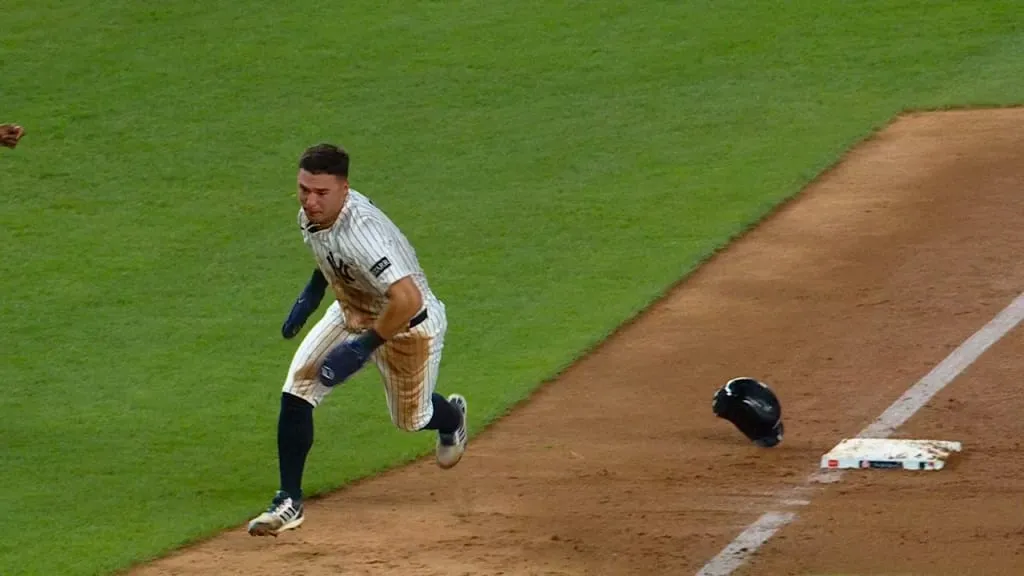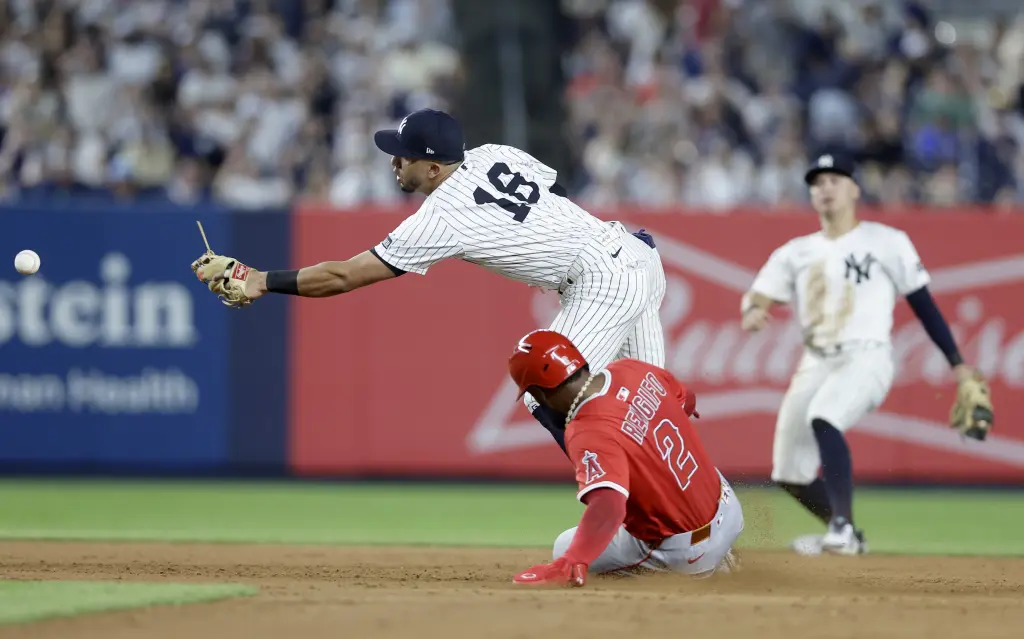

How Volpe’s Catastrophic Bunt Pushed the Yankees to the Brink
In the high-stakes world of Major League Baseball, every play can tip the scales between victory and defeat. For the New York Yankees, a single miscalculation by young shortstop Anthony Volpe during a critical moment in a game against the Detroit Tigers has become emblematic of the team’s recent struggles. This article delves into the incident, its immediate consequences, and the broader implications for Volpe and the Yankees.
The Context: A Season of High Expectations
Anthony Volpe, a promising talent for the Yankees, entered the 2025 season with significant expectations. As a young shortstop in a storied franchise, the pressure to perform was immense. However, his season has been marred by inconsistencies both at the plate and in the field.

Volpe’s batting average has hovered around .207, a figure below expectations for a potential All-Star. Additionally, he leads the league with 19 errors, raising questions about defensive reliability. Such statistics have placed him under intense scrutiny from both management and fans. The Yankees, a franchise synonymous with excellence, have little tolerance for repeated mistakes, making every at-bat critical for a player attempting to establish his role in the lineup.
The Incident: A Bunt That Backfired
The pivotal moment occurred during a game against the Detroit Tigers at Yankee Stadium. In the fifth inning, with runners on first and second and no outs, Volpe was called upon to execute a sacrifice bunt—a fundamental play designed to advance the runners and increase scoring potential.

On a 2-1 pitch, Volpe attempted the bunt but failed to make proper contact, resulting in a pop-up caught by Tigers’ third baseman Colt Keith. This failure not only squandered a scoring opportunity but also intensified pressure on the Yankees’ offense.
Sacrifice bunts, while a minor part of the game statistically, can carry outsized importance in tight games. When executed properly, a bunt moves runners into scoring position and forces defensive adjustments. Conversely, a failed bunt can stall momentum and place additional stress on subsequent batters.
Fan Reaction: From Hope to Disappointment
The response from Yankees fans was immediate and vociferous. The home crowd at Yankee Stadium expressed displeasure with loud boos, reflecting high expectations for Volpe as a young, high-potential player.
Fans’ reactions often mirror their desire for decisive, aesthetically pleasing plays. In high-pressure situations, a failed bunt is perceived as a strategic misstep, eliciting frustration. For Volpe, the vocal criticism added a layer of psychological pressure, potentially affecting his focus and confidence in later innings.
Managerial Perspective: Balancing Development and Performance
Yankees manager Aaron Boone faced a difficult decision: balancing the development of a young star with the immediate demands of a competitive MLB season. Volpe’s potential is clear, yet his recent inconsistencies have raised legitimate concerns about readiness for high-pressure moments.
Boone’s management strategy reflects a commitment to player development. By providing opportunities to learn from mistakes, Volpe can gain experience in real-game scenarios, which is essential for growth. However, sustained underperformance may necessitate temporary adjustments to his role, especially as playoff contention looms.
The Broader Impact: A Symbol of Teamwide Challenges
Volpe’s failed bunt is emblematic of broader challenges faced by the Yankees. The inability to capitalize on scoring opportunities, coupled with defensive lapses, has contributed to a series of disappointing results.
For instance, in the same game, the Yankees suffered a 12-2 loss to the Tigers, exacerbated by a disastrous seventh inning where relievers Fernando Cruz and Mark Leiter Jr. allowed nine runs without recording an out. This collapse magnified the effects of Volpe’s earlier failure and highlighted systemic issues in pitching, situational hitting, and defensive execution.
Analyzing the game, we see the ripple effect of a single failed play: an early scoring opportunity lost, increased stress on subsequent batters, and a shift in team morale. Such scenarios illustrate how baseball is not only about individual plays but also about cumulative strategic decisions.
Long-Term Consequences of Volpe’s Failed Bunt: Lessons for the Yankees and the Young Star

Anthony Volpe’s failed bunt may seem like a single incident, but it offers important insights into psychological, tactical, and developmental aspects of baseball.
Psychological Impact on Volpe
Young players in MLB, particularly those in iconic franchises like the Yankees, face immense pressure. Volpe’s failure attracted public criticism, which can affect confidence and decision-making. Studies in sports psychology indicate that early-career public failures, if not managed well, may lead to performance anxiety or overcautious play.
However, with proper guidance and mental conditioning, Volpe can use this setback as a growth opportunity. Developing resilience, maintaining focus, and learning from mistakes are key for establishing a long-term career in the majors.
Tactical and Strategic Implications
From a strategic standpoint, a failed bunt alters inning dynamics. With runners on first and second and no outs, the Yankees’ expected run value (xR) was approximately 1.25 runs. A successful bunt could have increased this to 1.55 runs, enhancing the chance of scoring early. The failure disrupted the offensive plan, forcing later batters into higher-pressure situations and contributing to the team’s inability to maintain momentum.
Furthermore, the failed bunt highlights the importance of situational hitting skills for young players. Teams rely on precise execution in high-leverage situations to optimize scoring chances, especially when facing strong pitching.
Statistical Analysis and Real-World Effects
Examining Volpe’s subsequent plate appearances reveals slight performance deterioration. In the next five at-bats, he went 1-for-4 with a strikeout, reflecting minor pressure-induced inconsistency. The Yankees’ win probability before the bunt stood at 48%, dropping to 45% immediately afterward. While subtle, these changes underscore how small errors can accumulate, affecting overall game outcomes.
Over the long term, repeated failed situational plays can impact season metrics like batting average, on-base percentage, and Wins Above Replacement (WAR), emphasizing the need for coaching and skill refinement.
Lessons for Development and Team Management
For the Yankees, Volpe’s failed bunt serves as a case study in integrating player development with competitive priorities. Coaching interventions—such as bunting drills, situational simulations, and psychological support—can turn errors into learning experiences.
For Volpe, key lessons include understanding when to bunt, refining technique, and maintaining confidence under fan scrutiny. Historical data suggests that players who recover from early-season errors tend to exhibit higher mental toughness and statistical improvement in subsequent seasons.
Looking Ahead: The Road to Redemption

For Anthony Volpe, the path forward involves resilience, adaptation, and skill refinement. Maintaining focus, learning from mistakes, and capitalizing on future opportunities will be critical to rebuilding trust with fans and management.
For the Yankees, ongoing evaluation of roster composition, strategic coaching, and situational training is necessary to address weaknesses revealed in games like this. By treating isolated failures as developmental lessons, the team can transform short-term setbacks into long-term growth opportunities.
Conclusion: From One Bunt to Broader Lessons
While a failed bunt might appear trivial in a long MLB season, its implications are far-reaching. For Anthony Volpe, it represents both a challenge and a chance for growth. For the Yankees, it underscores the importance of execution, mental resilience, and strategic preparation. By addressing tactical errors, providing player support, and learning from individual moments, the Yankees can transform mistakes into stepping stones for sustained success.
Related News


















